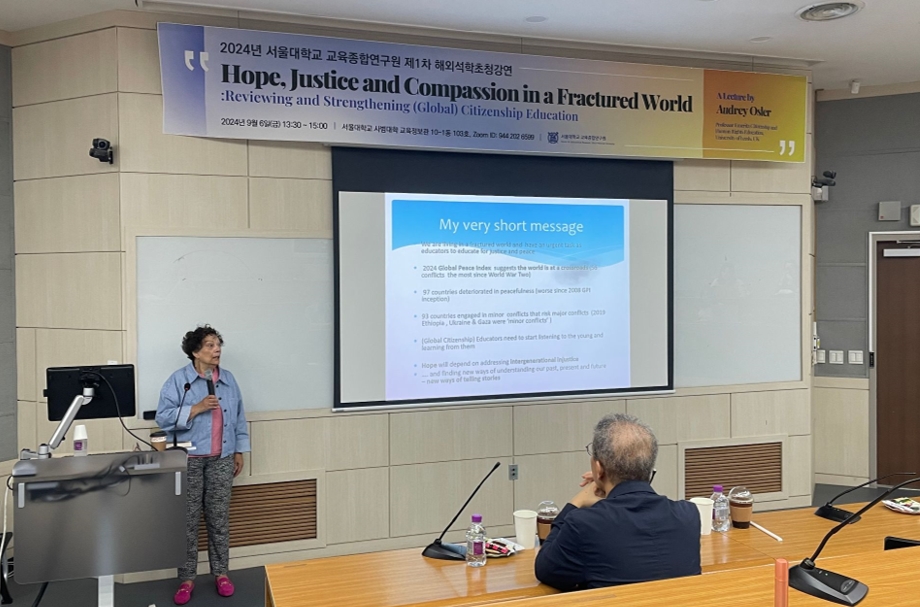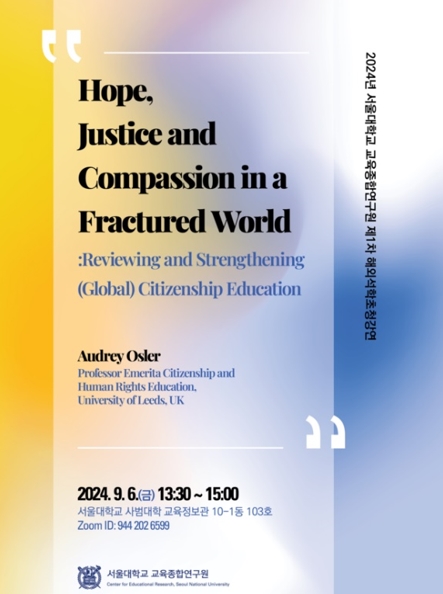The SNU Education Research Institute recently hosted its first Overseas Scholar Lecture of 2024 on September 6, with esteemed guest speaker Professor Audrey Osler from the University of Leeds. Established in 1963 and affiliated with the SNU College of Education, the Institute is dedicated to advancing education in Korea through research in educational theories and their practical applications. Professor Osler, a prominent figure in Global Citizenship Education (GCE), has advised organizations such as the Council of Europe, UNESCO, and various national governments. Her lecture, titled Hope, Justice and Compassion in a Fractured World: Reviewing and Strengthening (Global) Citizenship Education, explored her extensive work on GCE and her educational philosophies. The session was moderated by Professor Kim Joon Kium from the Department of Social Studies Education.

Professor Osler delivering her talk
While we often hear the common refrain that “children are our future,” we seldom explore what it truly means to educate them in ways that foster a better tomorrow. To ensure that children are our future, we must recognize that education cannot be divorced from politics and global events as the challenges we face impact both children and educators alike. In the talk, Professor Osler stressed how the fractured state of the world today impinges on us all and highlighted the urgent need for educators to inspire justice and peace through their teaching. Citing the 2024 Global Peace Index, she noted that the world stands at a critical crossroad with 56 active conflicts—the highest since World War II. There has been a decline in peacefulness across 97 countries, marking the most severe global conditions since the index’s inception in 2008. Professor Osler argued that hope for a better future hinges on addressing these intergenerational injustices and developing new frameworks for understanding our shared history and future. She emphasized that embracing multilateralism and reimagining GCE—in terms of policy, theory, and praxis—are crucial for building a more just and compassionate society.

The main poster
As detailed in the talk, the crux of Global Citizenship Education (GCE) is a civic learning approach focused on developing students’ connection to the global community and fostering an understanding of the importance of tolerance, equity, and peace. Rooted in human rights principles, GCE offers a cosmopolitan vision that contrasts sharply with the neoliberal frameworks often reflected in university policies. This approach is guided by key beliefs, including the 1948 Universal Declaration of Human Rights, the 1989 UN Convention on the Rights of the Child, and the 2011 UN Declaration on Human Rights Education and Training. While neoliberal frameworks and Global North interests often shape education policies into tools for competition and prioritize international rivalry over cooperation, GCE prioritizes empathy and compassion in student education. It aims to establish an educational model grounded in human rights and inclusive cosmopolitan citizenship. As such, this model goes beyond traditional frameworks that often focus on national or citizenship-based identities—models that can exclude refugees, undocumented migrants, and stateless individuals. GCE, instead, asserts that all students are human rights holders, promoting a sense of belonging that addresses physical, psychological, and social security. The philosophy emphasizes practical engagement and active participation in the community and ensures that education supports holistic development and global awareness.
Professor Osler emphasizes that for GCE to truly succeed, the culture of human rights must become a more prominent and innovative part of our global culture. She argues that current schooling practices are more often national projects as they focus largely on national history, symbols, myths, and literature. Since GCE is a cosmopolitan effort that highlights our shared humanity, it needs to transcend these nationalistic frameworks. To build a more just society, GCE seeks to empower students to recognize inequalities, challenge injustices, and foster solidarity. Above all, GCE reminds its students that humanity is the basis on which rights are claimed, not nationality or race.
In her hopeful conclusion, Professor Osler envisions students transformed by a human rights-based education. These students would become curious, confident, and engaged learners, deeply connected to their educational communities and assured of their teachers’ genuine care. Open to diverse perspectives and driven by a desire for knowledge, such students would be well-versed in the arts, literature, history, sciences, and social sciences. Most importantly, they would be compassionate individuals, ready to advocate for justice.
The topic of Global Citizenship Education (GCE) is especially pertinent for SNU and its vision of fostering an academic community at the vanguard of leading global transformation. As SNU continues to pursue academic excellence and seek truth, it is important to consider Professor Osler’s insights on GCE. Her talk is a profound reminder of the crucial role education plays in shaping empathetic and empowered students and how SNU should stay committed to leading the way into the future.
Written by Hyun Kyung Jung, SNU English Editor, jhyunk@snu.ac.kr

